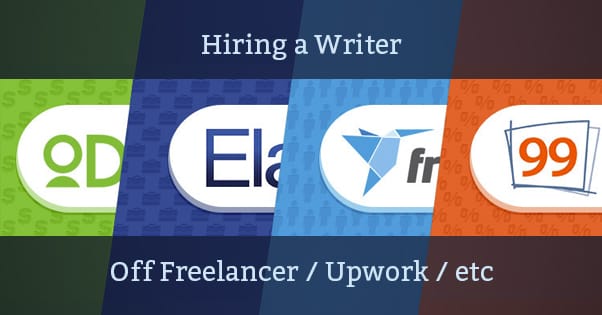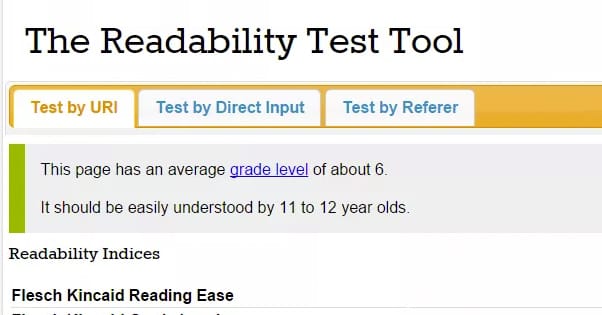How to Hire a Writer off Freelancer.com or Upwork
Published by James Parsons • Content Marketing • Posted August 31, 2017 ContentPowered.com
ContentPowered.com
Hiring writers is one good way to go from a mediocre blog to a great blog. Depending on how you hire them, you might just come across as an expert, or you might have a larger multi-author blog. Or both, really, if you have the budget for it. If nothing else, it’s cheaper than training an employee as a blog writer directly.
There’s no problem with hiring writers as ghostwriters to produce content for your site, published under your name. Many sites, ranging from Fiverr gigs to Textbroker to Upwork and Freelancer allow you to do this. It’s how thousands of talented writers make their livings. Some of the big name writers in your industry probably both hire writers for content for themselves, and sell their services as ghostwriters. One of the most famous is Kristi Hines, who is both a major name in marketing blogs, and a very talented writer for hire.
If you’re a newcomer to the idea of hiring writers, though, you have a lot of questions to answer before you can just dive in. Well, I mean, you can dive in directly if you want, but you might not be very effective without going through this checklist.
Establishing Your Needs
Freelance networks like Freelancer and Upwork are communities. The writers often have some element of communication with each other, and the most influential writers often have blogs of their own dedicated to freelancing. This means that if you prove yourself to be a poor client, you can gain a reputation, either on the site or on the internet as a whole. It’s worth avoiding common issues and having an idea of your needs upfront to avoid this kind of reputation. Here are some considerations you should think about before registering for one of these sites.
Choosing a site. Freelancer and Upwork are both large freelancing hubs. This is as opposed to sites like Textbroker, where they focus exclusively on writing. While the article you’re reading focuses on hiring a writer, know that you can also hire graphic designers, video producers, audio actors, and a whole lot else. Each type of content has its own community and its own average pricing.
Both sites are fairly similar in terms of how they work and the cuts they take. There’s only one major difference between them, and it’s the age of Freelancer.com. Freelancer is an older hub for contract work, and as such there has been a long, slow race to the bottom as far as pricing and quality go. You can certainly find high quality workers, and nothing compels you to pay sub-par rates, but you might find a lot of terrible writers jumping at your pitch on the off chance you settle with one of them.
I actually recommend trying out both of them for a few pitches, to see if one has what you want. It might take a few tries to get a writer that clicks with your needs, so don’t write off one site or the other based on one or two poor interactions.
Keep in mind that both sites allow you to pay for account upgrades that, for example, put your pitches in front of high quality premium writers before the general open pool, or give you a wider range of potential applicants. Check out the paid plans and determine if the benefits are worth shelling out the cash for.
Identifying your blog needs. Before you can pitch an article to either freelancing portal, you need to know what you want. I recommend having an idea of the topic and keywords you want covered, the word count, and any specifics like including specific links or avoiding specific links. You might want to tell your freelancer to avoid mention of your primary competitor, for example. Keep in mind that most writing freelance work is pay per word, so your prospective word count will do a lot towards:
Establishing a budget. How much are you willing to pay for quality writing? I’ve seen people work for less than a penny per word, and let me tell you; it looks like their content was run through Google translate, through four languages, and back to English. I’ve also known blogs that pay writers thousands of dollars for a single under 1,000-word piece. They get excellent quality content for their money. Remember that the higher the value of your pitch, the more people are going to try to apply for it, and the more dross you’ll have to filter through.
Ghostwriting versus credited writing. Generally, you’re going to want to start out with ghostwriting. This allows you to fill your blog with quality content without spending the time on writing it yourself, but still attaching your name to the value and quality it provides. There’s nothing wrong with doing this, and in fact a huge amount of the content you read on the internet every day has been ghostwritten.
Credited writing adds a benefit to the writer, but be aware that it can be difficult to establish that relationship. Freelancing networks generally have rules against contacting freelancers or clients directly. It can result in your account and that of the freelancer being closed, with any escrow payments seized. After all, the cut the site takes is their livelihood, so they don’t want you to be able to poach their writers.
That said, high quality writers often share their usernames around on other sites, so with a little careful Google searching you might be able to find them and approach them outside of the site. Just be aware that some of them will be skeptical; they don’t want to be caught and lose their main livelihood.
A note about contracts. You don’t have to worry about specifically forming a contract; the site generally takes care of that for you. They will have a standard agreement and system in place to ensure that you have veto power over the content, but that you also can’t take it and run. It protects both writers and clients from scams from each other. Read the contract, of course, but realize that if you’re working through these platforms, you generally aren’t able to request changes.
Tips for being a beloved client. As the person who is buying content, you want to avoid being a huge hassle to work with. At the same time, you want to make sure you can veto bad content so you don’t have to pay for trash.
- Strive to be appropriately detailed with your pitches and projects. Writers hate when you micromanage every paragraph, but at the same time, it can be quite challenging for them to produce something that satisfies you if you don’t give enough detail. If all you say is “write me an article about marketing” you can get content all over the board. If you give them a 10-page Google Doc of guidelines and rules, you’ll turn off all but the most desperate writers.
- Pay on time and always keep in mind the ability to tip writers whose content you really appreciate. Most payment concerns are more important for private contracts, since sites like Freelancer and Upwork will enforce escrow payments most likely.
- Don’t let things linger. If a freelancer submits a finished piece, go over it and decide if you want revisions or if you want to accept or reject it right away. Letting uncertainty linger is frustrating for the freelancer and they’ll be less likely to want to work with you again.
Also, be aware that sometimes the writer will want to communicate, to ask questions or to ask for clarification. Be aware that they probably have to do this through an on-site messaging system, so you should monitor that in case they ask for something.
Be Aware of Potential Personalities
There are five kinds of difficult writers you might encounter on a site like Upwork or Freelancer. It can be worthwhile to learn the warning signs of these kinds of people, so you know if you’re in for a difficult time or not.
Personality 1: The Frank Abagnale Wannabe. Frank Abagnale was a famous con-man, which you might know if you’ve ever seen Catch Me If You Can. You won’t find a con-man like that on a freelancer site, but what you might find are writers who are relatively new and who are inflating or faking their credentials. You can often see telltale signs of this; their writing looks amateur compared to their supposed PHD, or they write in wildly different styles and quality levels. Unfortunately, sometimes you simply don’t get to see this until they submit work that is dramatically worse than their profile makes it seem like they should produce.
Another scam you might encounter is one for per-hour work. If you’re paying a writer per hour instead of per word, keep an eye on their billable hours and see how it compares to what they should be producing. It doesn’t take anyone 25 hours to write a 500-word blog post.
Personality 2: The Reverse Micromanager. These kinds of writers, as soon as they pick up the project, bombard you with questions. They ask so many questions that in answering them you practically write the article yourself. Some of them don’t know how to work well on their own and need that much help, but that’s not your problem; cancel the project. Some of them are worse; they might think they know better than you what your site needs, and they might even belittle you. Even if they’re right, they aren’t worth the stress, so just cancel the project and move on.
Personality 3: The Penny Master. These people are typically residents of a country like India or Malaysia, where the cost of living is extremely low and where earning $5 can go a long way compared to in America. Since they’re willing to work for peanuts, it can be tempting to save money by hiring them.
Frankly, this is usually a bad idea, but it’s not a costly mistake. You’ll find more of these people on Freelancer, and you’d see a ton of them if you went over to Textbroker. Just remember; you get what you pay for, so if you’re paying a tiny amount, you’re getting very low quality content.
Now, very rarely, you’ll find a great writer who simply hasn’t gotten themselves established. They produce high quality work for much less than they’re worth. Honestly? If you find one of these people, start paying them more than they expect and they’ll be loyal for a long time.
Personality 4: The Criminal. Freelancing hubs tend to have plagiarism scanners for written work, but some don’t, and sometimes stolen content can be spun and made to look unique. Either way, these writers aren’t actually writing anything for you; they’re copying content, stealing content, spinning content, or going to an ultra-cheap content mill and profiting off of work they bought.
Always double-check your projects, with direct plagiarism checks and with similarity checks. Also be aware of speed; if a writer produces a 10,000-word ebook in an hour, you know it’s not legitimate.
Personality 5: The Magical Disappearing Writer. As you might have been able to guess, it can be very disruptive if you get halfway through a project only to have the writer go missing. Sometimes there’s a good reason; family disaster, local disaster that knocks out power, or something similar. Sometimes the writer has found a more lucrative source of income and abandons their writing career. Sometimes they just pick up every project they can and work on them as long as it’s easy to do, and drop projects that prove to be too much.
To a certain extent you can avoid driving off writers like this by being mostly hands-off. Writers are professionals, and you’re hiring them for their skill. It’s good to trust them enough to let them do their thing. Of course, this doesn’t guarantee that the writer sticks around, it just helps minimize the chances of them cutting and running.
You can help avoid these kinds of writers by checking the work history for the writer. If you see flags like low completion rates or negative reviews, you might want to stay away.
From here, you know about as much as you need to get started. It’s up to you whether or not you can carry on with profitable content from your initial investment. I recommend giving it a shot, but always be prepared for a loss and don’t invest more than you can afford to lose.










